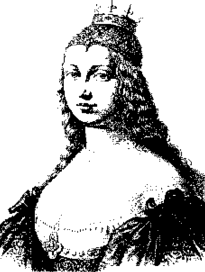Henry VI (2)
Henry VI came of age in 1437, but from the start he was dominated by factions and favourites. The pious*, humble, and unambitious Henry lacked the ability to lead; his neglect of government and his insistence upon ill-considered policies (particularly concerning France) caused him to be labelled a fool*.
Henry's weakness and obvious favouritism towards a narrow court faction led to a breakdown of local order throughout the realm; then when he married Margaret of Anjou, as part of a truce (1445), the lively young Queen soon took a large share in governing the King*--and thus the country.
The end of an empire
The year 1453* was a major turning point of Henry VI's reign and of English history: after a brave but hopeless defense led by John Talbot, Earl of Shrewsbury, Gascony fell to the French--it was the oldest of England's possessions in France, and the last remnant of Henry II's one-time "Angevin empire."
The Lancastrian government was completely discredited; it was then even further disabled when the King lapsed into insanity, entering a trance for 18 months. Thus ended the Hundred Years War of England and France, the early stages of which brought long-remembered glory to the English. Henry VI was afterwards never more than a puppet king, and the stage was set for the Wars of the Roses.
Footnotes
-
The pious warrior-king
Henry V was able successfully to combine piety with warmongering, fuelling his ambitions in France with fanatic self-righteousness. Henry VI, however, disregarded "worldly" affairs, bringing anarchy to his realm as a result. Ironically, the Tudor interpretation of history praised the piety of Henry VI, and saw disorder as resulting from the neglect of divine will by the first Lancastrian king, the usurping Henry IV.
-
The fool king
It is to be inquired. . .whether John Merfeld of Brightling, hubandman, and William Merfeld of Brightling. . .in the open market. . . falsely said that the King was a natural fool and would often hold a staff in his hands with a bird on the end, playing therewith as a fool, and that another king must be ordained to rule the land, saying that the king was no able person to rule the land.
(from a court document of 1450, quoted in Cook, Lancastrians and Yorkists: The Wars of the Roses, 81) -
Governed by a woman
The Roman soldiers in Shakespeare's Antony and Cleopatra have similar difficulties with their perception that Cleopatra dominates Antony; just before the crucial battle of Actium Canidius remarks:
. . . so our leader's led,
And we are women's men.
(3.7.69-70) -
1453
It was also an important year for all Europe, as Constantinople fell permanently to the Muslims--an event often used as a reference point marking the end of the Medieval era.
